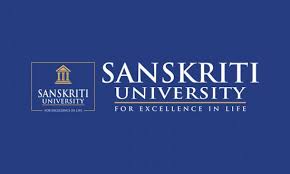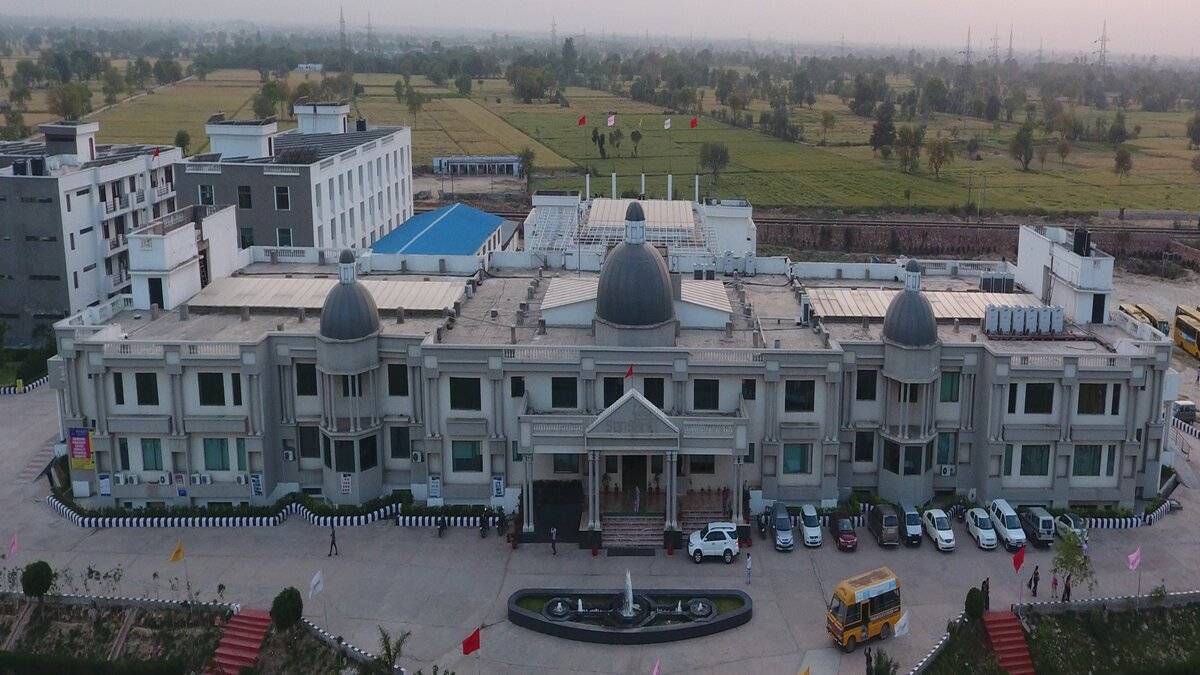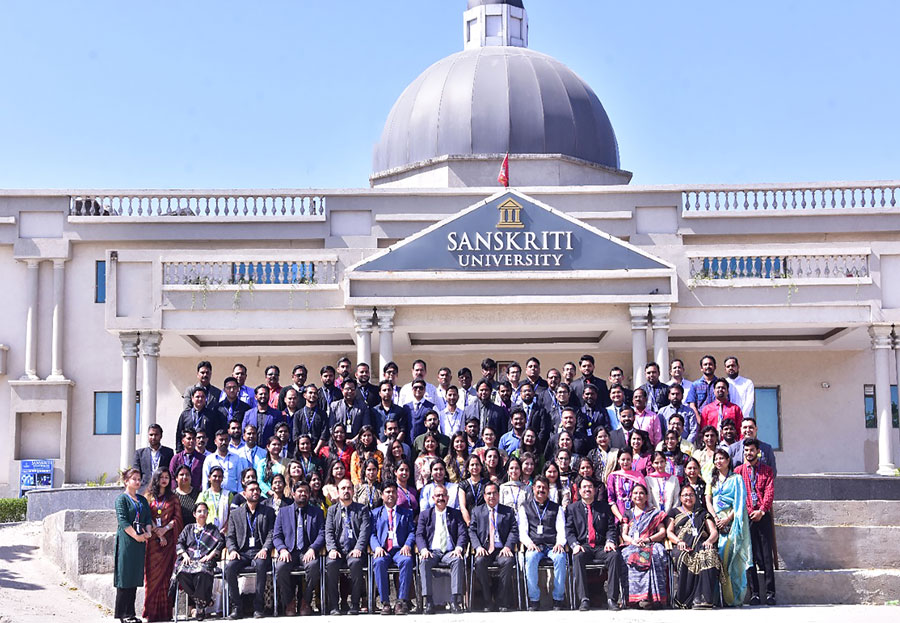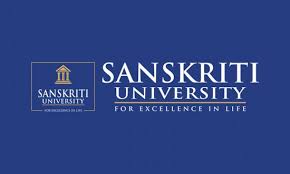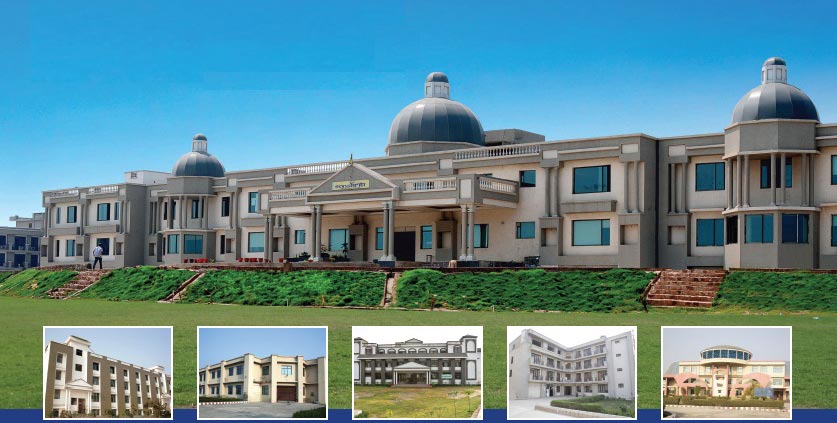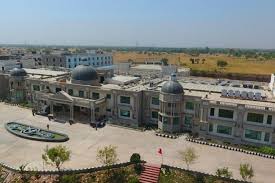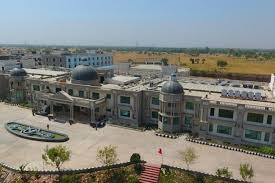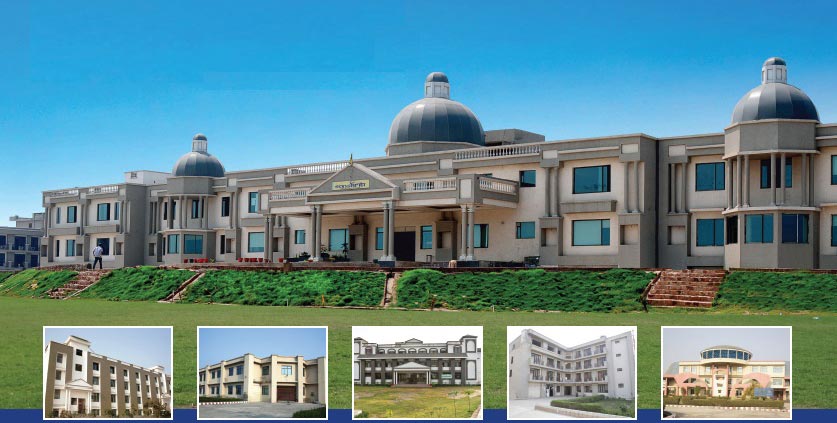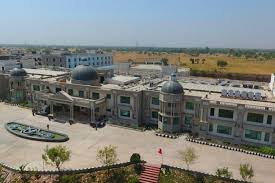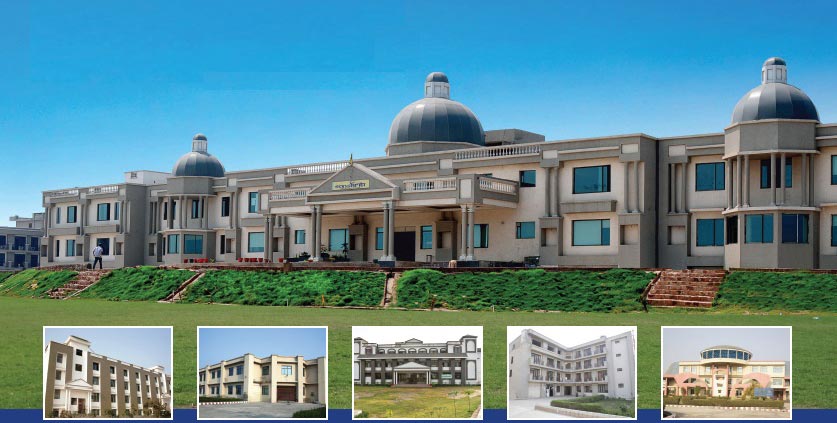- Overview
- Courses & Fees
- Admissions
- Placements
- Infrastructure
- NEWS
- Gallery
Overview
Sankskriti University is a private university which is Mathura based. It was established in the year 2016. It is a hub for the holistic development of its students. It offers not only opportunities for global collaboration but also Chancellor Scholarship for meritorious students. The college is home to the Centre of Krishna Consciousness, launched by Ex-Education Minister Ramesh Pokhriyal, blending spiritual values with academic learning. Additionally, it houses the First Incubation Centre for Entrepreneurship Development in the Mathura district, offering students the opportunity to nurture innovative ideas and transform them into successful ventures. The teaching methodology at the college is designed to foster both intellectual and personal growth, incorporating diverse methods such as the Case Study Method, Team Projects, and Fun-Based Learning to engage students effectively. With the use of App-Based Learning and regular Brainstorming Sessions, the college ensures an interactive and technology-driven approach to education, helping students develop practical skills while fostering creativity and critical thinking.
The University is recognized by the UGC Commission. The mission is deep-rooted in not just imparting knowledge but also skills, ethics and compassion which will empower students to thrive and do better in future.
Courses & Fees
| Course | Duration | Yearly Fees | Eligibility |
| BTech (6 specializations available) | 4 years | 1,30,000-1,70,000 |
Passed 10+2 with Physics and Mathematics (compulsory) with at least 50% marks. OR Passed 10+2 with Physics, Mathematics, and one of Chemistry/Biotechnology/Biology/Technical Vocational subject/Computer Science/Information Technology/Informatics Practices/Agriculture/Engineering Graphics/Business Studies with at least 50% marks (45% for reserved category). |
| BTech Lateral Entry | 3 years | 1,30,000 | Passed 10+2 with Physics and Mathematics (compulsory) with at least 50% marks. |
| MTech | 2 years | 1,70,000 |
B.Tech. with minimum 50% marks in the relevant branch or 60% in MCA for Computer Science & Engineering. B.Tech. with minimum 55% marks in the relevant branch or 60% in MCA for Computer Science & Engineering. |
| BCA (6 specializations available) | 3 years | 80,000-1,20,000 | 10+2 with minimum 50% marks in the best four relevant subjects. |
| MCA (4 specializations available) | 2 years | 70,000-1,15,000 |
Passed BCA/ Bachelor Degree in Computer Science Engineering or equivalent. OR Passed B.Sc./B.Com./B.A. with Mathematics at 10+2 or Graduation Level (with bridge courses as per norms) with at least 50% marks (45% for reserved category). |
| Diploma (17 specializations available) | Depends on specialization | 42,000-60,000 |
10+2 with Science/Mathematics/Vocational subject or 10th + 2 Year ITI with 50% marks. OR 10th with minimum 50% marks in aggregate. |
| BCom | 3 years | 60,000 | 10+2 with minimum 50% marks in the best four relevant subjects. |
| BBA (4 specializations available) | 3 years | 80,000-1,00,000 | 10+2 with minimum 50% marks in the best four relevant subjects. |
| MBA (2 specializations available) | 2 years | 1,50,000-1,60,000 |
Bachelor degree (any discipline) or equivalent with 50% marks in aggregate. Preference to candidates with CAT/MAT/X-MAT/NMAT scores. |
| BPT | 4 years | 90,000 | 10+2 with Physics, Chemistry, & Biology with at least 50% marks. |
| MPT (4 specializations available) | 2 years | 90,000 | BPT with minimum 50% marks and completion of a 6-month internship. |
| BSc (10 specializations available) | 3/4 years | 60,000-2,00,000 | 10+2 with Physics, Chemistry, & Biology with at least 50% marks. |
| MSc (9 specializations available) | 2 years | 60,000-2,40,000 | Bachelor's degree in Life Sciences or related field with 50-60% marks. |
| B.Pharm | 4 years | 1,25,000 | 10+2 with PCM/PCB/PCMB and English (as per PCI norms). |
| B.Pharm (Lateral Entry) | 3 years | 1,35,000 | Pass in D.Pharm course from PCI-approved institution. |
| M.Pharm | 2 years | 10,000 | B.Pharm degree with minimum 50% marks from a recognized institute. |
| BA Fashion Designing | 4 years | 50,000 | 10+2 with minimum 50% marks. |
| BA LLB | 5 years | 80,000 | 10+2 with minimum 50% marks. |
| BCom LLB | 5 years | 80,000 | 10+2 with minimum 50% marks. |
| BSc Hotel Management | 4 years | 60,000 | 10+2 with minimum 50% marks. |
| BDes (3 specializations available) | 4 years | 2,95,000 | 10+2 with minimum 50% marks. |
| BA Hons (Psychology) | 3 years | 60,000 | 10+2 with minimum 50% marks. |
| B.Ed (6 specializations available) | Varies | 45,000-70,000 |
Bachelor's/Master's in Sciences/Social Sciences/Humanities with 50% marks. OR 10+2 with at least 50% aggregate marks in Humanities/Science. |
| M.Ed. | 2 years | 50,000 | B.Ed. with 50% marks in aggregate or equivalent. |
| B.Voc Medical Laboratory Technology (MLT) | 75,000 | 10+2 with Physics, Chemistry & Biology with at least 50% marks. | |
| Bachelor of Medical Lab Science (B.M.L.S) | 90,000 | 10+2 with Physics, Chemistry & Biology with at least 50% marks. | |
| D.Ed (2 specializations available) | 45,000 | As per R.C.I Norms. |
Admissions
Step 1: Eligibility Criteria
The first step for a candidate is to check the eligibility criteria for the desired course. The eligibility criteria may include various requirements that candidates must meet in order to qualify for admission.
Step 2: Registration Form
The candidate then needs to fill the application form in order to be registered. This contains the credentials of the candidate and their parents. There should always be full and fair disclosure of information.
Step 3: Registration Fee
While submitting the application form the candidate also has to pay a fee of 10,000. This is non-refundable and only after the payment, the candidate can apply for the desired course.
Step 4: Selection
After submitting the application fee, the students are selected on basis of different criterias varying from merit to inter-personal skills. Upon selection the candidate will receive the offer letter.
Step 5: Payment of Fee
The selected candidate will get a time period of 15 days to submit the fee and enroll themselves for the course.
Step 6: Verification of Documents
The candidates need to the visit the campus for the physical verification of documents. Some of the documents include
A Bank Draft of the amount indicated in the offer letter as first Installment.
*Admission Form (Hard Copy) duly filled in & signed by the Candidate & Parent.
Proof of Date of Birth.
Certificate and Mark sheet of 10th & 12th Examination.
Certificate and Mark sheet of Graduation/Post Graduation, if applicable.
Placements
The cell helps with the placement process in the following ways
1.Continuous Engagement with Reputed Companies
The T&P Cell is proactive throughout the year, consistently reaching out to an increasing number of reputed companies. This helps create a greater number of placement opportunities for students, enabling them to appear for interviews with several organizations and choose the best options for their career.
2. Collaboration with Corporate Leaders
The members of the T&P Cell engage with CEOs and HR Heads of various organizations to gather detailed information about recruitment requirements across different fields. This ensures that students are aware of the specific skills and qualifications needed to be eligible for interviews with leading companies.
3. Comprehensive Grooming and Training
To enhance students' performance in interviews, the T&P Cell ensures they are properly groomed and trained. This includes working closely with faculty members and corporate trainers in personality development. Regular feedback from organizations helps the cell make necessary adjustments to improve training and ensure students are fully prepared for professional environments.
4. Up-to-Date Market Insights
The T&P Cell continuously gathers information from multiple sources, such as websites, newspapers, and other platforms, to stay updated about company brand images, HR policies, salary packages, and work cultures. This enables students to make informed decisions about potential employers and helps the cell provide relevant and current placement opportunities.
5. Corporate Interaction and Employability Assessment
The cell organizes corporate meets at least twice a year, where students interact with industry leaders. These meetings allow companies to assess students' aptitude, attitude, knowledge, and personality. This direct interaction not only helps students understand employer expectations but also aids in evaluating their employability and aligning their skills with industry demands.
Top Recruiters
Infrastructure
1. Library
The university’s library is a valuable resource supporting both education and research, offering over 1,00,000 books and subscribing to 50 Indian and 25 international journals, along with e-journals. It provides a conducive learning environment with ample space, furniture, and a reading room. Additionally, the Book Bank Facility allows students to access required textbooks for each semester, supplementing their regular library book issuance.
2. Hostel Facilities
The university provides hostel facilities for both domestic and international students, ensuring a safe and clean environment. Separate hostels are available for boys and girls. The hostel service is designed to be student-friendly, offering a comfortable and homely atmosphere. Special care is taken for the maintenance of the hostels to ensure students feel at home during their stay.
3. Safety Facilities
The Sanskriti campus, including hostels, is secured with a high boundary wall and barbed wire to prevent unauthorized entry. The campus has a single-entry gate, manned 24/7 by armed security guards. Bags and belongings of students and visitors are manually checked, and a metal detector is used at the entrance. An electronic register is maintained for visitors, recording their details along with identification proof and contact numbers. CCTV cameras are installed at strategic locations, and the canteen and mess are closely monitored. Students are provided ID cards, which must be displayed at all times on campus. Special security is arranged at the girls' hostel, where no male is allowed, and female students are not permitted to enter or leave the hostel after specified hours.
4. Cafeteria
The cafeteria is designed to accommodate a large number of people while maintaining an aesthetic appeal. Quality and hygiene are the top priorities, with regular quality control checks ensuring the highest standards. There is a strict adherence to cleanliness, with no compromise on food quality, kitchen hygiene, or raw materials used. The cafeteria offers ample space and well-arranged furniture for comfortable seating. As the entire campus is a no-smoking zone, strict vigilance is maintained within the cafeteria to prevent smoking or the consumption of tobacco in any form.
5. Sports
The campus offers sports facilities like Badminton, Volleyball, Football, Lawn Tennis, Basketball, and Cricket. Students are encouraged to participate in regular sports, with inter and intra-institute tournaments leading to the Annual Sports Meet. A gymnasium is available for physical fitness, promoting regular exercise for physical and mental development. Top performers in sports and cultural activities are nominated for inter-college meets, offering opportunities to excel at State and National levels.
NEWS
Sanskriti Technology Incubation Foundation: Empowering Innovators and Startups
Turning an idea into a successful business requires more than just innovation—it demands the right support, resources, and opportunities. Sanskriti Technology Incubation Foundation (STIF), an initiative of Sanskriti University, Mathura, is dedicated to helping startups and entrepreneurs transform their concepts into real-world solutions.
With a strong focus on technology-driven entrepreneurship, STIF provides an ecosystem where innovators can develop prototypes, access funding, and receive mentorship to navigate the challenges of building a business.
Comprehensive Support for Startups
Startups need more than just an office space—they need an environment that fosters growth, collaboration, and learning. STIF offers a range of resources to help entrepreneurs at every stage of their journey.
Co-working Space – A collaborative and flexible workspace designed to encourage creativity and innovation.
Mentorship – Access to experienced industry leaders, entrepreneurs, and experts to guide startups through their growth challenges.
Training Programs – Workshops and sessions focused on entrepreneurship, business development, and cutting-edge technologies.
Funding Opportunities – Grants and investment support to help startups scale and bring their ideas to market.
Networking Events – Platforms for startups to connect with investors, industry professionals, and fellow entrepreneurs.
&nsbp; Building the Future of Innovation
Supporting startups is not just about providing resources—it’s about fostering an ecosystem where ideas thrive. Sanskriti Technology Incubation Foundation is committed to nurturing talent and innovation, ensuring that promising ideas turn into impactful solutions. Entrepreneurs and startups looking for guidance, mentorship, and funding can apply for incubation support and become part of a thriving community that is shaping the future of technology and business.
Video
Images
Sanskriti Technology Incubation Foundation: Empowering Innovators and Startups
Turning an idea into a successful business requires more than just innovation—it demands the right support, resources, and opportunities. Sanskriti Technology Incubation Foundation (STIF), an initiative of Sanskriti University, Mathura, is dedicated to helping startups and entrepreneurs transform their concepts into real-world solutions.
With a strong focus on technology-driven entrepreneurship, STIF provides an ecosystem where innovators can develop prototypes, access funding, and receive mentorship to navigate the challenges of building a business.
Comprehensive Support for Startups
Startups need more than just an office space—they need an environment that fosters growth, collaboration, and learning. STIF offers a range of resources to help entrepreneurs at every stage of their journey.
Co-working Space – A collaborative and flexible workspace designed to encourage creativity and innovation.
Mentorship – Access to experienced industry leaders, entrepreneurs, and experts to guide startups through their growth challenges.
Training Programs – Workshops and sessions focused on entrepreneurship, business development, and cutting-edge technologies.
Funding Opportunities – Grants and investment support to help startups scale and bring their ideas to market.
Networking Events – Platforms for startups to connect with investors, industry professionals, and fellow entrepreneurs.
&nsbp; Building the Future of Innovation
Supporting startups is not just about providing resources—it’s about fostering an ecosystem where ideas thrive. Sanskriti Technology Incubation Foundation is committed to nurturing talent and innovation, ensuring that promising ideas turn into impactful solutions. Entrepreneurs and startups looking for guidance, mentorship, and funding can apply for incubation support and become part of a thriving community that is shaping the future of technology and business.




